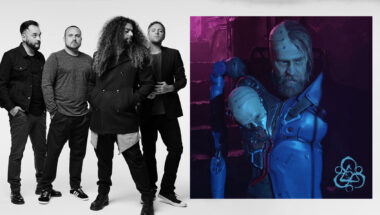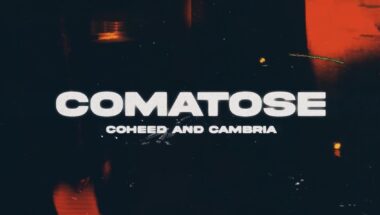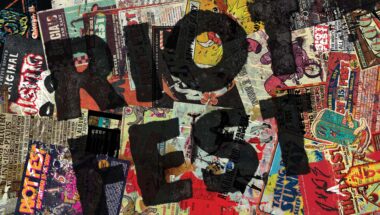Coheed and Cambria have been experts at navigating their unique cross-genre sound since releasing The Second Stage Turbine Blade, their first studio album, in 2002. Blending elements of progressive rock with heavy metal, post-hardcore, and pop isn’t the only example of Coheed exploring different genres and media, though. Much of the band’s lyrical content is composed of characters and stories that appear in The Amory Wars, a science fiction comic book series published by Coheed frontman Claudio Sanchez, who first conceptualized the idea over 20 years ago as a way to hide his autobiographical stories inside of songs depicting fantastic sci-fi tales.
As the band prepares to release Vaxis II: A Window of the Waking Mind on June 24, the second record in their Vaxis pentalogy (and the latest story arc in The Amory Wars saga), Riot Fest spoke with Sanchez about the new album’s pop sensibilities, his ability to tell stories through both written and audio-visual media, and how his own life is reflected in his sci-fi fantasy world.
RIOT FEST: You’re just a week away from releasing your latest record, Vaxis II: A Window of the Waking Mind. How are you feeling?
CLAUDIO SANCHEZ: I’m very excited. The record has been done for about a year, and we’ve been sitting waiting patiently to put it out there into the world. I’m thrilled about the material and about the process of making this record because we got to explore some avenues that we haven’t in the past with some of the earlier records.
Coheed and Cambria is known for flexing outside of our comfort zone, but there are some limitations that come with that because—although we do have side projects—I sometimes find that I want the dividing line between those things to be pretty absolute. This time around, I had some feelings that certain territory was off limits, and I thought, “Why?” That’s such a silly thing to pose. So we brought in some elements of programming and a more pop-sensible situation that we haven’t explored in the past, with songs like “A Disappearing Act” or “Bad Man.”
Due to the feelings of restriction during the pandemic, I was feeling that life’s too short, why not give everything a shot? [My music] doesn’t have to live exclusively in these houses that I built for them; it’s all coming from the same place, so it shouldn’t matter.
When it comes to taking Coheed in a more pop-oriented direction, were there any influences that inspired this different sound?
I think it was just the freedom to explore new things. I had just gotten off of writing a solo record called The City Introvert, which is very lo-fi pop-leaning, so some of those songs on Vaxis II have some of that in them—but they’re colored in a way with certain instrumentation that I think makes it more Coheed-friendly. At the root of it, when you hear a song like “A Disappearing Act” or Bad Man,” or “Love Murder One,” you can hear that kind of pop sensibility. But structurally, it’s eight-string guitars and live drums against programmed drum machines, so there is still a rock element to it.
Can you fill me in a bit on the thematic content of the new record, and how it ties in with The Amory Wars saga?
This record is the second chapter in the Vaxis pentalogy. It’s where we finally, as listeners and readers, witness the character of Vaxis and the trials that his parents go through to get him the help they think he needs. A lot of it is a reflection on being a parent in the situation of the pandemic; learning how to do certain things that weren’t “the norm” before. That’s found its way into some of the themes of the album.
We introduce the readers and listeners to new villains, who are ultimately the villains within this story arc, but it’s really about introducing them to Vaxis and his situation, getting him out of that, then posing the cliffhanger of, “What’s next?”
How do you decide which parts of The Amory Wars will be put to music? Do you view these records as an accompanying soundtrack to your written work, or are your novels expanding on the stories that appear on your records?
When I initially created this idea, I did it because I had a hard time representing myself in songs as the figurehead of a band. I created the science fiction concept so I could take my experiences and hide them in this decorated piece of fantasy. Now, 20 years into the process, I can understand where a story is supposed to go ultimately. Like, for Vaxis II, III, IV, V, I know where those stories are supposed to go and how it’s supposed to finale—but I allow life to curate what those moments are going to be. While I’ll understand conceptually where an album has to go, my life experiences will curate what the parts in that story are going to be.
All of The Amory Wars very much cataloged my life. When I think of the earlier five records of Coheed and Cambria, I sort of think of them as this biography of my life in my adolescence: coming into manhood, dealing with whatever emotions come with that, the self-destruction of being the frontman of a band, the pressures that come with that… and then I look at Vaxis arc and I look at that as my biography of myself being a father and a husband and the trials that I will go through in this part of my life.
My life, going through the situations that we all experienced over the last couple of years, has really decorated what this part of the story is. Whatever happens in the next couple of years will help decorate subsequent stories, like with writing Vaxis III. Once the songs are written, I’ll start to detail them in sort of an outline—whereas before I would just write them, now my wife and I have partnered up and she helps in some of the actual scripting.
After you’d created a sci-fi story to help tell you own stories, how did that extend to becoming its own graphic novel saga?
I always loved the comic book medium. At first, I was just a fan. But when I became the singer of a band and started to create songs, I realized that I was taking what I was doing and making it about something because I was shy and had a hard time expressing myself.
In 1998, I took a trip to Paris, France, and I spent a month there—I think I was 18—and that’s where I started to construct this idea of Coheed and Cambria to basically unify the songs that I was writing as one big story opposed to these little episodes of random things. Because of my love for comics, I thought it’d be fun to tell this in a more visual format… and what’s better than comics? I think there’s a big freedom there.
It’s funny, because I was going to school for audio engineering at this time. I had come back, written a bunch of songs for Coheed—this was before Coheed actually put the first record out—and I stopped in the comic shop and picked up a couple of new books, The Walking Dead and Red Star, and it just clicked that, “Oh, this is the medium I should be telling the story, once it gets to that point.”
Do you still feel that shyness in expressing yourself to the point it’s still necessary to use a sci-fi world? Or has this grown into a larger saga that you prefer to use as your primary creative device?
With time, I have become more confident, but I’ll always be introverted. Over 20 years, there is a level of confidence, but I’ll still never shake who I am. There will always be moments of the concept that I don’t necessarily want to completely reveal. As far as like me saying, I see myself as the father role of this story and it alludes to a family that is a bit influenced by my own, but that’s probably as much as I’ll ever comfortably reveal.
Not being a visual artist yourself, did you ever feel that would be a barrier in how you’d be able to convey your stories?
No, not at all. Back in those early days, for conceptual stuff I would use Adobe Illustrator to convey what I was trying to get at. I would construct outlines or blueprints, and for general aesthetics as far as character creation, a lot of that has ended in the language and description, so that wasn’t an issue for me. Being being a fan of comics, I’ve always known reading the relationships between writers, artists, inkers, colorists, from reading the credits and liners.
Your songs are neither strictly autobiographical, nor are they strictly about The Amory Wars. Because of their nuance, do you ever worry that listeners may not connect with the intended message or theme of a song?
I think we’re lucky in that regard, because I think Coheed fans certainly understand the universal message, and I think that’s what’s given us the liberty and allowed us to be the band that we are for 20 years now. I feel like that message is always received, and it’s also really exciting when fans want to take that initiative and explore the other dimension of what we do with the concepts.
In my opinion, I think to fully enjoy music, you need to have some sort of connection—whether it’s with the melody, whether it’s the lyrics—there needs to be some sort of connection that you get, and I think our fans are really great at understanding the true meaning of what Coheed is. I’ve also met fans who have different takes on the meaning of our songs, and I love that. I think that’s a big part of why I love music: regardless of what was initially expected, there’s still that connection… and I think that’s the important part thats creates an intimate fan relationship.
Coheed and Cambria will bring its Window of the Waking Mind tour to Chicago at SeatGeek Stadium on Saturday, August 6, with special guests Alkaline Trio and Mothica. 7000 S Harlem Ave, Bridgeview, IL 60455. All Ages, 5:30 p.m.; get your tickets here.



